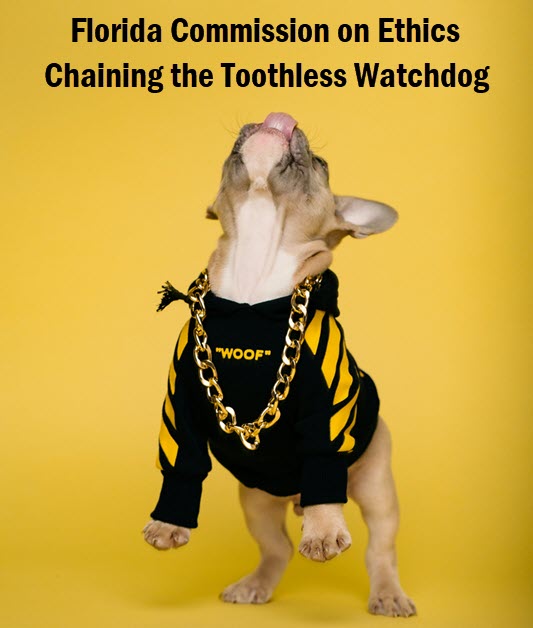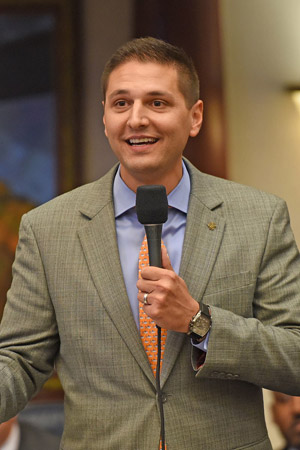Florida Commission on Ethics: Chaining the Toothless Watchdog
Porous state ethics laws are getting weaker
July 3, 2024 1:35 am | 3 min read

Photo: Karsten Winegeart via Unsplash | Columbia
County Observer graphic
The Florida Commission on Ethics was born about 50 years ago, when a pandemic of state and national political scandals made our legislators very anxious to look virtuous — while not, of course, getting too fussy about all that fair play and honesty stuff.
Some cities and counties followed up over the decades with do-gooder panels of their own that provided citizens a forum for whistle-blowing and gave local officeholders something to think about before using their government positions for personal gain or advancement to bigger jobs.

Senate Ethics and Elections Chairman Danny Burgess,
R-Zephyrhills, helped lead efforts to revamp state
ethics laws.
The net result was fairly limited financial disclosure requirements for politicians and maybe a little less evasion of "sunshine" laws requiring open meetings and access to public documents. It is not the nature of the political beast to create laws that might someday snag them, so ethics laws were made as porous as possible.
Now, Gov. Ron DeSantis has signed a new law that further sedates an already-somnolent watchdog.
The biggest thing SB 7014 does is to require that all ethics complaints be based on personal knowledge of the people filing the complaints, not hearsay. Complaints also must be sworn and signed. That seems reasonable at first glance — we don't need political rivals using the law to snipe at each other anonymously — but how often does a mayor or county commissioner do something unethical with witnesses around?
If you hear some local official say, “I should disclose my ownership of this land we’re rezoning, but that would be embarrassing,” chances are you’re either in on the fix or your job depends on keeping quiet. People with personal knowledge of someone else’s ethical conflicts are usually called “accomplices” or “co-conspirators,” not “whistleblowers.”
The new law limits members of the state Commission on Ethics to two terms. That's probably enough since they won't have much to do anymore, but there's no need to put it into law. Republicans really, really like term limits.
Restrictions also apply to local ethics boards, which towns like Miami and Jacksonville established. Ethics panels will be forbidden to initiate investigations on their own, and the Commission on Ethics will face a one-year limit on preliminary investigations, which determine whether a full commission hearing is needed.
Forbidding anonymous complaints is fair — you ought to put your name on your accusations — but it goes too far. Ethics panels should know an informant’s name but perhaps keep it confidential until probable cause is established.
The concept of a non-partisan, state-independent ethics panel came about in a fun period of Florida politics.
While the nation was entertained by Watergate, Tallahassee had a lieutenant governor dropped from Gov. Reubin Askew's 1974 re-election ticket for using a couple of Commerce Department employees to work at his farm, a U.S. senator dropped his re-election bid under a cloud, and two Supreme Court justices were ousted for official imprudence. Askew, a man of boring probity and great popularity, led a petition campaign resulting in Florida's "Sunshine Amendments" that included requiring financial disclosure by public officials.
It was a great time to be a Capitol reporter, but many public officeholders didn't share Askew's appetite for clean campaigning and honest government. Some of them quit rather than publicly report their financial holdings, and the ones who remained enacted regulations on lobbyist gifts and political campaign funding that gave an appearance of virtue while accomplishing as little as practical.
Unfortunately, the ethics system has been easily abused. There's always the political gadfly who'll file an ethics complaint just because something looks a little suspicious or the supporters of one candidate who try to ambush another with baseless allegations. News clippings like "Smith Hit With Ethics Charge" or "Was Smith's Use of State Planes Legit?" are useful in campaign ads, and never mind if the allegations had any truth to them.
But rather than further weakening the ethics panels, a better solution would have been to encourage them not just to dismiss a bogus complaint with a "no probable cause" finding but to publicly rip it up, kick it to the gutter, and tell the complainant to stop filing junk.
---------
Bill Cotterell is a retired capitol reporter for United Press International and the Tallahassee Democrat. He can be reached at wrcott43@aol.com
This piece was reprinted from News Service Florida by the Columbia County Observer with permission or license. Some graphics, layout, added by the Observer.

 By
Bill Cotterell | News Service Florida
By
Bill Cotterell | News Service Florida